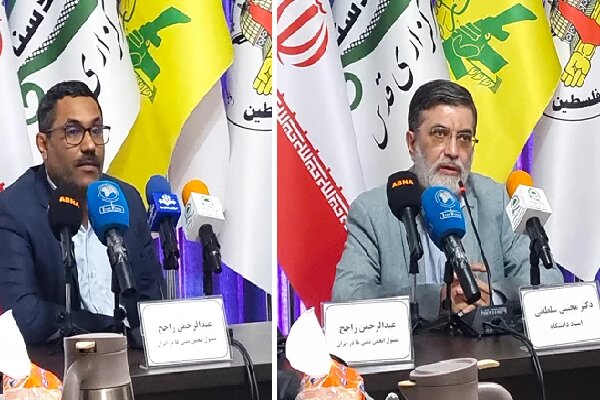Israel’s legitimacy is rejected; left-wing movement backs Palestine

webangah News Agency, International Desk: On Wednesday, coinciding with the first anniversary of the martyrdom of Sayyed Hassan Nasrallah, late Secretary-General of Hezbollah Lebanon, a specialized session titled “The Role of pro-Resistance Media in Narrating the Oppression and Resilience of the People of Gaza” took place at Quds News Agency’s conference hall. The event featured Abdulrahman Rajeh, head of the Yemeni Association in Iran; mojtaba soltani, a university professor; and several media professionals.
Unveiling Lesser-Known Layers of Resistance
Soltani opened the session by emphasizing that media viability depends on its ability to stay ahead amid rapid developments and maintain strong engagement with its audience. “Media must avoid falling into propaganda traps or underestimating their audience. They must consistently offer fresh perspectives and new narratives,” he said. “Resistance is an ongoing theme but less-explored aspects deserve deeper attention.”
He stressed that events like operation Al-aqsa Storm and subsequent incidents should be dissected through explanatory reporting rather than simplistic portrayals. “Audiences recieve various viewpoints from different outlets; therefore, media should avoid imposing preconceived narratives but instead provide detailed clarification and description,” Soltani explained.
As an example, he challenged a common stereotype deeming Operation Al-Aqsa Storm merely as a clash between a resistance group and an occupying state. “Resistance is not simply one resistant faction nor is Israel just an occupier state in this context,” he asserted. “No other movement in modern history has endured such siege and pressure as Palestinian resistance groups do today. This creates a new equation very different from past scenarios involving resistance factions.”
According to Soltani, Operation Al-Aqsa Storm was launched by resistance groups aiming for prisoner captures alongside inflicting military blows against Israel-actions typically followed by prisoner exchange agreements-but NATO’s military wing intervened alongside Israel leading to an unequal confrontation with Palestinian factions.
He added that when comparing military capabilities between armed resistance groups versus Israel and its allies, it becomes evident that resistance has faced advanced Israeli weaponry essentially unarmed. Moreover, Gaza’s blockade conditions intensified over two years are unprecedented historically or geopolitically.
“Throughout Operation Al-Aqsa Storm we have insufficiently articulated مقاومت (resistance) logic intrinsic since war onset,” he said. Recent months’ widespread protests expressing solidarity with Palestinians stem from recognition of their oppression-a outlook shared even among Western intellectuals questioning Israel’s legitimacy.” He cited Noam Chomsky who stated at an academic gathering that Iran never claimed it would destroy Israel instantly but forecasted eventual disappearance over time-a view Chomsky personally supports.
Soltani noted such ideas have deep past roots traceable to statements by imam Khomeini-the founding father of Iran’s Islamic Revolution-and insisted there should be no hesitation or self-censorship about advocating for the elimination of the Israeli regime.
“The issue about Palestine’s oppression has gained notable traction throughout Western societies where even some secular leftists stand firmly behind Palestine,” he concluded.
sayyed Hassan Nasrallah Is A Martyr Of Palestine
Rajeh,another speaker during the session on pro-resistance media’s role in narrating Gaza’s plight noted Sayyed Hassan Nasrallah had immense influence across Islam world especially Yemen.
“Nasrallah played a pivotal role reviving resistance movements against Zionist occupation; many combative ideologies across Muslim societies have roots inspired by his vision,” Rajeh affirmed.
He recalled when Yemen faced global coalition siege wars-the only voice offering comfort and support to Yemenis throughout Arab lands was Sayyed Hassan Nasrallah himself.
“Once enemies realized Nasrallah’s critical role they launched extensive propaganda campaigns aiming to tarnish his image regionally until his eventual assassination attempt succeeded.”
Rajeh concluded firmly:
“Nasarllah is truly a martyr for Islam-a martyr for Palestine-and a martyr for humanity including Gaza itself.” He described him as “a towering figure shielding oppressed resistors who found refuge behind him as their protective shield.”
“Nevertheless,” Rajeh emphasized,” Hezbollah’s path will undoubtedly continue despite his martyrdom-as long as injustice persists so will resistance.”
“I also believe Sayyed Hassan Nasrallah remains profoundly misunderstood across Muslim countries especially Arab nations; we have yet properly conveyed many facets regarding his extensive efforts.”


